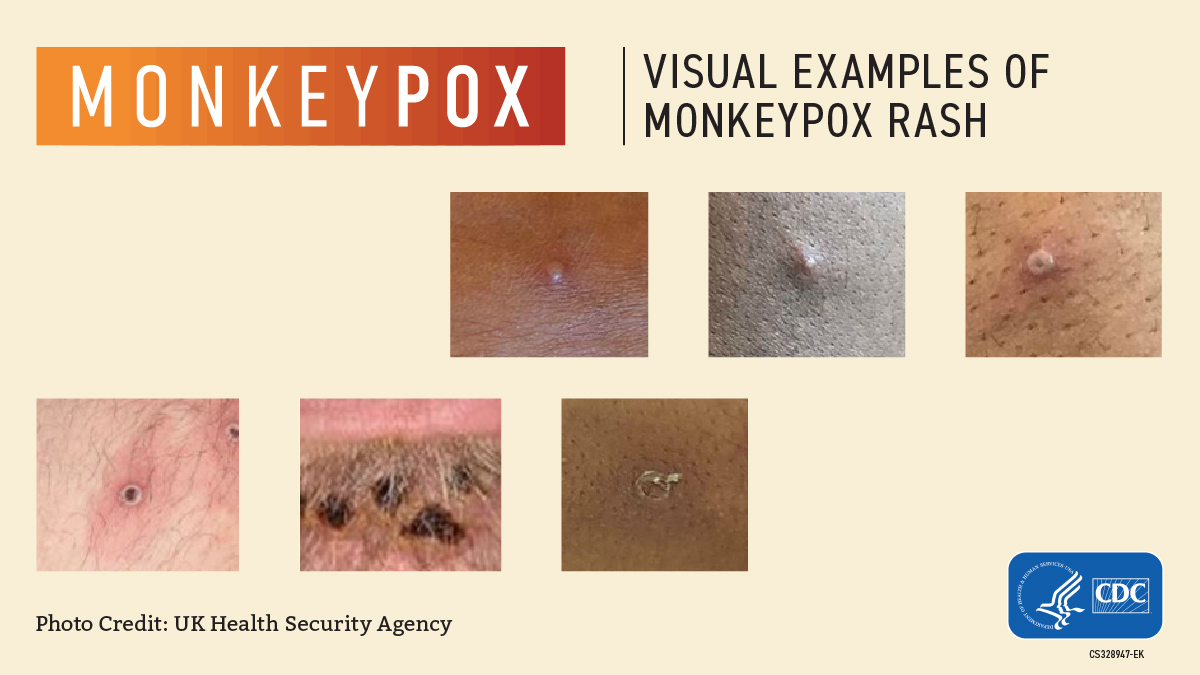
Mpox Fast Facts:
Mpox is a rare disease caused by infection with the mpox virus.
Symptoms of mpox can include:
- Fever
- Headache
- Muscle aches and backache
- Swollen lymph nodes
- Chills
- Exhaustion
- Rash that can look like pimples or blisters that appears on the face, inside the mouth, and on other parts of the body, like the hands, feet, chest, genitals, or anus.
The rash usually appears 1-2 weeks after infection, and goes through different stages before healing completely. The illness typically lasts 2-4 weeks. Sometimes, people get a rash first, followed by other symptoms. Others only experience a rash. Most infections get better without medication and do not require hospitalization.

Mpox spreads in different ways. The virus can spread from person-to-person through:
- Direct contact with the infectious rash, scabs, or body fluids
- Respiratory secretions during prolonged, face-to-face contact, or during intimate physical contact, such as kissing, cuddling, or sex
- Touching items (such as clothing or linens) that previously touched the infectious rash or body fluids
Mpox can spread from the time symptoms start until the rash has fully healed and a fresh layer of skin has formed. It is also possible for mpox to spread between humans and animals.
People should take the following steps to prevent getting mpox:
- Avoid close, skin-to-skin contact with people who have a rash that looks like mpox.
- Do not touch the rash or scabs of a person with mpox.
- Do not kiss, hug, cuddle, or have sex with someone with mpox.
- Do not share eating utensils or cups with a person with mpox.
- Do not handle or touch the bedding, towels, or clothing of a person with mpox.
- Wash your hands often with soap and water or use an alcohol-based hand sanitizer.
Frequently asked questions:
How can I get the mpox vaccine?
LCGHD is not providing prophylactic, or preventive vaccinations for mpox. LCGHD will work with the Ohio Department of Health to vaccinate individuals exposed to a confirmed mpox case. Right now, Ohio has a very small supply of vaccine to help prevent mpox.
What do I do if I think I have mpox?
Talk to your healthcare provider about being tested for mpox. Follow their directions, and maintain isolation from others. Avoid sex or being intimate (close contact) with anyone, until all your sores have healed and you have a fresh layer of skin formed.
Is there any treatment for mpox, and where do I get it?
If an individual tests positive for mpox, their healthcare provider may treat them with an antiviral called TPOXX.
Does the varicella (chickenpox) vaccination protect against mpox?
No, it does not. Mpox is an orthopoxvirus, while chickenpox is a herpes virus. They are not related.
Is the mpox vaccine part of the normal birth to 18 years vaccine schedule?
No, it is not. At this time, the mpox vaccine is only given to people who have been exposed to a person who has mpox.
Where is the mpox virus spreading?
Please refer to the following resources from the U.S. Centers for Disease Control and Prevention (CDC):
2022 U.S. Map and Case Count
2022 Global Map and Case Count
Is mpox a concern for pets?
The mpox virus can spread between animals and humans. Please see CDC’s website for more information.
Where can I get more information?
For more information about mpox, vaccination options, prevention, signs and symptoms and other information, visit https://www.cdc.gov/poxvirus/monkeypox/index.html

